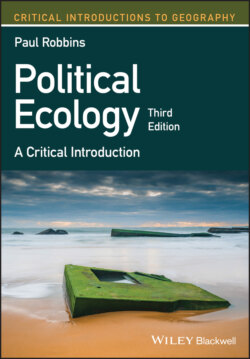Читать книгу Political Ecology - Paul Robbins - Страница 41
Julian Steward: a positivist alternative
ОглавлениеThe postwar period brought with it a change in the structure and direction of social scientific research. While the historicism of human ecology continued to be championed by researchers like Sauer, a new generation of cultural researchers became increasingly interested in an explicit, predictive science, one that sought laws with universal applicability using rigorous, quantitative investigation of cause and effect. Inspired by positivist approaches to social science – those that sought to establish scientific theories and laws of social behavior and function – these researchers wanted to move beyond descriptive histories and landscape studies. Without returning to crude determinism, anthropologists and geographers were searching for a science of culture.
In Julian Steward, they found an intriguing alternative. In contrast to Sauer and other historicists, Steward was driven by an interest in cross‐cultural comparison. While the historicist notion of history creating culture, he claimed, avoids the problems of determinism, he insisted that it could not explain, and so must be rejected (Steward 1972).
Like the cultural historians, Steward was emphatic in insisting that environmental factors do not determine humanity. Unlike Sauer and others, however, he insisted that human interaction with nature through subsistence and work is the determinant and directing influence of environment on the social and cultural order. The theoretical basis of this form of human ecology was elaborated as a model of determinant factors, premised on the imperatives of making a living, extending outwards to more contingent and globally varying cultural features (Figure 2.1). At the center of human societies, Steward argued, is a “culture core,” those fundamental features of human life, especially technology, necessitated by the conditions under which subsistence is achieved through farming, herding, collecting, and working more generally.
Figure 2.1 Julian Steward's cultural ecology.
The core includes such social, political, and religious patterns as are empirically determined to be closely connected with these arrangements. Innumerable other features may have great potential variability because they are less strongly tied to the core. These latter, or secondary features, are determined to a greater extent by purely cultural‐ historical factors – by random innovations or diffusion – and they give the appearance of outward distinctiveness to cultures with similar cores. Cultural ecology pays primary attention to those features which empirical analysis shows to be most closely involved in the utilization of environment in culturally prescribed ways.
(Steward 1972, p. 37)
These features were necessarily determinant of other, more contingent cultural factors. Thus semi‐arid ecosystems, for example, do not determine the structure of a society in any simple way. But since all societies who hunt and gather in semi‐arid ecosystems face similar production challenges, common social structural solutions might be hypothesized, influencing property relations, marriage patterns, food sharing, and other facets that together make up human cultural life. These patterns might give rise to a range of higher‐order cultural functions, hierarchy, cosmology, and the broader morals and ideals of the larger culture group. Other cultural features may prove to be unrelated to subsistence practice and to have arisen through interaction with other groups or through “random innovations.”
Methodologically, Steward's model formed a clear mission for researchers. By observing many cases of the same kinds of production and comparatively assessing those cultural characteristics that do and do not vary, researchers can scientifically understand what the ordered functions of social and cultural process might be. This regime further compelled researchers to study more “simply structured” and less complex social groups – hunter‐gatherers, agriculturists, and herders. Though the same principles applied to modern industrial societies, it was reasoned, a scientific study should begin at the simple and extend only slowly to more complex cases (Steward 1972). Like Sauer, therefore, Steward's cultural ecology would focus on subsistence producers in rural areas, often in underdeveloped contexts. The implications of this for later political ecology cannot be overstated (Figure 2.1).
Moreover, while Steward never directly references Marx or other Marxist theorists, in his concerns for production at the center of the “culture core,” he comes quite close to articulating a materialist approach to culture, one fundamental to Marxian notions of the “mode of production” (Murphy 1981). For Marxian social science, explanations of history follow from tracing the way in which people make a living and its determinant impact on social organization, the flow of value, and the arrangement of labor. This would hold implications for research many years later. The transition from positivist cultural ecology to the critical challenges of political ecology did not compel a reorientation away from production. Indeed, Steward's most prominent students, including Sidney Mintz and Eric Wolf, pursued political ecology throughout their careers.
